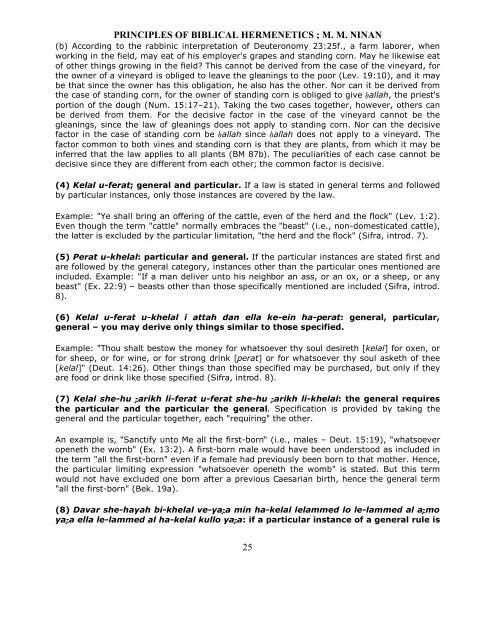Biblical Hermeneutics
Create successful ePaper yourself
Turn your PDF publications into a flip-book with our unique Google optimized e-Paper software.
PRINCIPLES OF BIBLICAL HERMENETICS ; M. M. NINAN<br />
(b) According to the rabbinic interpretation of Deuteronomy 23:25f., a farm laborer, when<br />
working in the field, may eat of his employer's grapes and standing corn. May he likewise eat<br />
of other things growing in the field? This cannot be derived from the case of the vineyard, for<br />
the owner of a vineyard is obliged to leave the gleanings to the poor (Lev. 19:10), and it may<br />
be that since the owner has this obligation, he also has the other. Nor can it be derived from<br />
the case of standing corn, for the owner of standing corn is obliged to give ḥallah, the priest's<br />
portion of the dough (Num. 15:17–21). Taking the two cases together, however, others can<br />
be derived from them. For the decisive factor in the case of the vineyard cannot be the<br />
gleanings, since the law of gleanings does not apply to standing corn. Nor can the decisive<br />
factor in the case of standing corn be ḥallah since ḥallah does not apply to a vineyard. The<br />
factor common to both vines and standing corn is that they are plants, from which it may be<br />
inferred that the law applies to all plants (BM 87b). The peculiarities of each case cannot be<br />
decisive since they are different from each other; the common factor is decisive.<br />
(4) Kelal u-ferat; general and particular. If a law is stated in general terms and followed<br />
by particular instances, only those instances are covered by the law.<br />
Example: "Ye shall bring an offering of the cattle, even of the herd and the flock" (Lev. 1:2).<br />
Even though the term "cattle" normally embraces the "beast" (i.e., non-domesticated cattle),<br />
the latter is excluded by the particular limitation, "the herd and the flock" (Sifra, introd. 7).<br />
(5) Perat u-khelal: particular and general. If the particular instances are stated first and<br />
are followed by the general category, instances other than the particular ones mentioned are<br />
included. Example: "If a man deliver unto his neighbor an ass, or an ox, or a sheep, or any<br />
beast" (Ex. 22:9) – beasts other than those specifically mentioned are included (Sifra, introd.<br />
8).<br />
(6) Kelal u-ferat u-khelal i attah dan ella ke-ein ha-perat: general, particular,<br />
general – you may derive only things similar to those specified.<br />
Example: "Thou shalt bestow the money for whatsoever thy soul desireth [kelal] for oxen, or<br />
for sheep, or for wine, or for strong drink [perat] or for whatsoever thy soul asketh of thee<br />
[kelal]" (Deut. 14:26). Other things than those specified may be purchased, but only if they<br />
are food or drink like those specified (Sifra, introd. 8).<br />
(7) Kelal she-hu ẓarikh li-ferat u-ferat she-hu ẓarikh li-khelal: the general requires<br />
the particular and the particular the general. Specification is provided by taking the<br />
general and the particular together, each "requiring" the other.<br />
An example is, "Sanctify unto Me all the first-born" (i.e., males – Deut. 15:19), "whatsoever<br />
openeth the womb" (Ex. 13:2). A first-born male would have been understood as included in<br />
the term "all the first-born" even if a female had previously been born to that mother. Hence,<br />
the particular limiting expression "whatsoever openeth the womb" is stated. But this term<br />
would not have excluded one born after a previous Caesarian birth, hence the general term<br />
"all the first-born" (Bek. 19a).<br />
(8) Davar she-hayah bi-khelal ve-yaẓa min ha-kelal lelammed lo le-lammed al aẓmo<br />
yaẓa ella le-lammed al ha-kelal kullo yaẓa: if a particular instance of a general rule is<br />
25


















